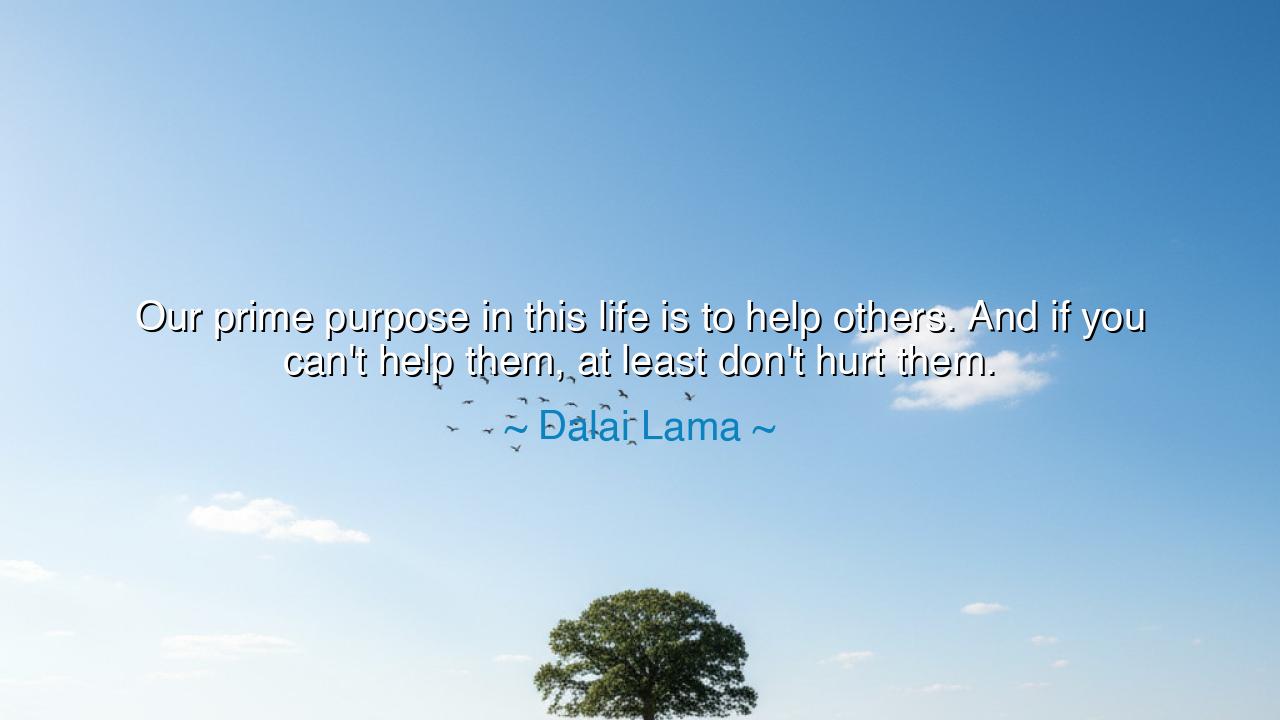
Our prime purpose in this life is to help others. And if you
Our prime purpose in this life is to help others. And if you can't help them, at least don't hurt them.






“Our prime purpose in this life is to help others. And if you can’t help them, at least don’t hurt them.” Thus spoke His Holiness the Dalai Lama, the spiritual leader of Tibet, whose words flow like clear water from the mountain of compassion. In this single teaching, he offers the essence of all moral law — the heart of every faith and the wisdom of every age. For what greater duty does one soul have toward another than to be of service, and what deeper sin is there than to inflict harm upon the innocent? This is not a command born of religion alone, but of universal truth, for kindness is the natural language of the heart, and mercy the truest expression of human greatness.
The Dalai Lama, a man who has known both power and exile, speaks not from abstraction but from experience. Torn from his homeland as a young man, he witnessed his people suffer under oppression, yet he responded not with hatred but with compassion. In the face of injustice, he did not cry for vengeance but for understanding. From this crucible of suffering, his teaching emerged — that our purpose in life is not domination or gain, but service and compassion. To live rightly, he tells us, is to lighten the burdens of others, to dry their tears, to bring warmth where the world has turned cold. Even if we cannot always heal or uplift, we must at least refuse to wound.
This wisdom echoes across the ages. The Buddha taught that to harm another being is to harm oneself, for all life is bound by a single thread. The Christ said, “Love your neighbor as yourself,” knowing that compassion is the bridge between man and the divine. The Stoics of Greece held that the good life is one lived in harmony with others, guided by reason and benevolence. And in the sacred traditions of every land, from the teachings of Confucius to the songs of the Vedas, the same truth is sung: that kindness is the highest form of strength, and that to cause harm is to step out of harmony with the universe itself.
Consider the example of Oskar Schindler, the German industrialist who risked everything to save more than a thousand Jews during the Holocaust. At first, he sought only profit, living for pleasure and ambition. But as he watched the cruelty of war devour the innocent, compassion awoke within him. He could not end the suffering of the world, but he could refuse to be a participant in its evil. He used his wealth and influence not to rise higher, but to protect the helpless. In this, he fulfilled the Dalai Lama’s teaching — he could not help everyone, but he would not stand by and harm. His life became proof that even in the darkest hour, the choice to do good — or at least to do no harm — is the most powerful act a human being can make.
The Dalai Lama’s quote is both simple and profound, for it rests upon a truth so plain that many overlook it: we are all connected. The joy of one strengthens the whole; the pain of one weakens it. To help another is to help the greater body of life; to harm another is to poison it. In recognizing this, we see that compassion is not a burden but a liberation — it frees the soul from the narrow prison of self. The one who helps others discovers that love is not something given away, but something multiplied in the giving.
Yet there is also a warning within his words. If we cannot rise high enough to help, let us at least not sink low enough to harm. There are times when our hands are bound, when the world’s suffering seems beyond our reach. In such moments, restraint becomes its own virtue. To speak no cruelty, to judge no one harshly, to do no injury — these are quiet forms of mercy that ripple farther than we know. Even silence, when it spares another’s pain, becomes a form of help. The Dalai Lama reminds us that goodness is not always grand; sometimes it is simply the refusal to add to the world’s sorrow.
So, my child, take this teaching to heart: live for the sake of others. Let compassion guide your speech, your actions, your thoughts. When you meet joy, share it; when you meet suffering, soften it; when you meet helplessness, remember that even a kind word is a gift. And when you find yourself unable to heal or give, then at least step gently, that your presence brings no harm. For to live thus — with kindness, humility, and restraint — is to fulfill the purpose of life itself.
In the end, the Dalai Lama’s words are both a command and a comfort. They remind us that goodness is within the reach of all. You need not be rich, wise, or powerful to make the world better — you need only be kind. Help where you can. Heal where you are able. And when you cannot, hold your hand still and your heart open. For in a world where so many seek to conquer, the greatest soul is the one who simply chooses not to hurt.






AAdministratorAdministrator
Welcome, honored guests. Please leave a comment, we will respond soon